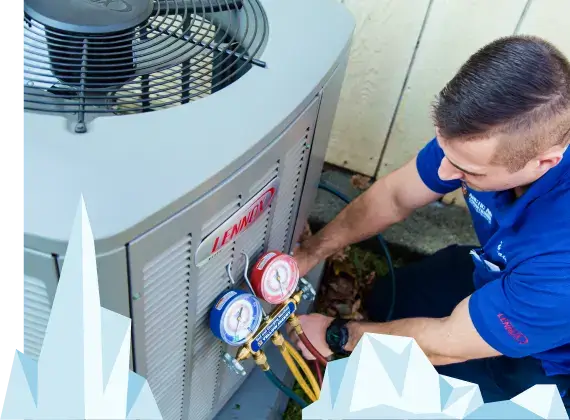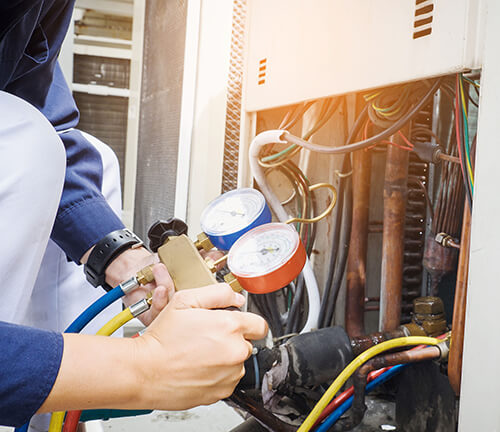Affordable System Upgrades with DMAKS HVAC Custom Options.
Affordable System Upgrades with DMAKS HVAC Custom Options.
Blog Article
Just How to Pick the Right A/c System for Your Requirements
Choosing the appropriate heating and cooling system is an important decision that requires mindful factor to consider of different elements. Begin by assessing your home's size, layout, and one-of-a-kind demands, as these aspects dictate the essential capability and setup of the system. Additionally, developing a spending plan that includes installation and lasting operational prices is necessary. As you weigh your options, understanding power effectiveness ratings and the implications of your regional climate will certainly play a considerable role in your option. The myriad of system kinds readily available can complicate this process, leading one to ask yourself which path inevitably leads to optimal convenience and performance.
Analyze Your Home Dimension
Analyzing your home dimension is an important very first step in selecting the proper A/c system. A Cooling and heating system that is too small will certainly battle to keep comfy temperature levels, leading to boosted power intake and use on the device.
To properly examine your home dimension, determine the square video footage of each room, thinking about factors such as ceiling elevation and the design. Additionally, think about the insulation high quality and the number of home windows, as these components impact thermal performance. Homes with open flooring plans may require various system setups compared to those with many separated areas.
Making Use Of the Guidebook J tons computation method can give a much more accurate estimate of your cooling and heating requires. This technique accounts for numerous aspects, including neighborhood climate, solar gain, and occupancy patterns. By thoroughly assessing these facets, you can make sure that your chosen cooling and heating system is properly sized, leading to boosted convenience, energy effectiveness, and longevity of the equipment.
Determine Your Spending Plan
Identifying your spending plan is a critical action in the heating and cooling system option process, as it establishes the specifications for your alternatives - DMAKS HVAC. A heating and cooling system is a significant investment, and comprehending your monetary limits will certainly assist tighten down options that fit within your means
Begin by examining not only the preliminary acquisition price yet likewise installation costs, which can differ significantly depending upon the intricacy of the project. In addition, think about recurring expenses such as maintenance, repair services, and energy consumption. A system may show up cost effective originally but can result in greater prices over time if it is less efficient.
It is a good idea to designate a backup fund for unexpected costs that may occur throughout setup or preliminary system changes (DMAKS HVAC). Furthermore, check out financing choices or discounts that might be readily available, as these can reduce the problem of ahead of time costs
Eventually, having a clear budget permits you to engage with heating and cooling professionals much more effectively, guaranteeing you get customized recommendations that aligns with your economic goals and home demands. By being attentive regarding your spending plan, you can make educated choices that improve convenience without jeopardizing financial stability.
Evaluate Power Effectiveness
Energy effectiveness plays a vital function in the overall performance and cost-effectiveness of your HVAC system. When picking a system, it is vital to consider its power effectiveness rankings, as these figures straight influence your utility costs and environmental impact. Look for systems with a high Seasonal Energy Performance Ratio (SEER) for cooling down and a high Yearly Fuel Use Performance (AFUE) score for home heating. Greater ratings suggest better efficiency, indicating even more comfort for much less power consumption.
In addition, consider the Energy Star accreditation, which indicates that the system meets stringent efficiency standards established by the Epa. Investing in an Energy Star-rated cooling and heating system official website can lead to substantial savings over time, particularly in areas with extreme temperature fluctuations.
Another factor to assess is the system's size and capacity. An oversized or undersized unit can lead to inefficiency and increased energy prices. DMAKS HVAC. Correct sizing, frequently identified with a Manual J load calculation, ensures that the system runs at ideal performance


Consider Climate and Atmosphere
When picking a cooling check my source and heating system, it is essential to think about the regional environment and ecological problems, as these variables significantly affect the system's efficiency and effectiveness. Various areas experience differing temperature level extremes, moisture levels, and seasonal modifications, all of which effect heating and cooling down needs.

Moreover, regional ecological elements, such as air top quality and prospective irritants, should inform your option. Equipments geared up check this with innovative filtration innovations can aid reduce contaminants and give cleaner air. Furthermore, consider the energy resources readily available in your area-- some a/c systems are extra efficient when powered by gas or eco-friendly power sources.
Eventually, aligning your heating and cooling system option with your neighborhood climate and ecological considerations will lead to enhanced comfort, enhanced effectiveness, and reduced power prices.
Explore System Types and Features
As property owners look for to enhance convenience and performance, exploring the various kinds of heating and cooling systems and their special attributes comes to be crucial. The key kinds of HVAC systems consist of central air, heatpump, ductless mini-split systems, and furnaces. Each system offers distinct benefits customized to various needs and preferences.
Central air conditioning systems provide consistent air conditioning throughout a home, making them ideal for bigger rooms. Warmth pumps work as both heating and cooling services, utilizing electricity to transfer warmth, which can cause lower energy costs. Ductless mini-split systems are coming to be progressively prominent because of their flexibility and ease of installment, permitting house owners to control the temperature in specific areas without substantial ductwork.

Conclusion
In final thought, picking the ideal heating and cooling system demands cautious factor to consider of various variables, consisting of home dimension, budget constraints, power efficiency, regional climate, and offered system types. A thorough assessment of these elements guarantees ideal comfort and cost-effectiveness. By following an organized approach, homeowners can make informed decisions that align with their specific demands and choices, inevitably bring about boosted interior air high quality and energy savings.
Report this page